Building Your Honor Bound Character
Honor Bound is the upcoming fourth title in the Crème de la Crème Series, coming December 2024. If this is news to you, read more about it here!
| Wishlist on Steam | Discussion Thread |
Character Background
The Honor Bound PC has been through a lot more than any of the other characters in the Crème de la Crème Series, so I wanted to go into more detail about what had gone in in their life before the start of the game and help the PC feel like the player's own.
Age
The PC's age can be between late 20s, 30s, or early 40s. The Honor Bound PC's age affects their military rank—the older they are, the more senior they are—and how characters treat them in various situations.
Gender
The PC can choose their pronouns or the player can enter their own. The PC can also choose whether they're cis or trans regardless of pronouns.
In my earlier games, players could choose pronouns but couldn't specify that they were trans or specify aspects of their
If the PC is trans, they can choose between a number of ways in which they've medically transitioned, or not at all, and generally specify what their body is like (or leave the details more up to the player to imagine if they prefer it or the options don't quite feel right). Playing as trans, and talking to other characters about it, results in unique interactions: with other trans characters in particular, and with others too.
Orientation
There isn't an option to specify that the PC is gay, straight, or bisexual, but they can express their orientation via who, if anyone, they romance. They can also choose whether they've had romantic or sexual relationships before, and whether they consider their experience casual, serious, or one-off encounters.
The PC can specify that they're asexual, demisexual/grey-ace, or aromantic. This opens up a variety of conversations both with romantic interests and other characters, and changes some descriptive text and interactions.
Appearance
You can choose the PC's height, build, and skin colour. You can also choose the PC's hair colour, texture and style. I always want appearance choices to feel impactful in the game as well as being present in the player's mind, so I often refer to height and build in situations where, for instance, a character of a different height hugs the PC or the PC needs to duck through a short doorway and such. And at one point you can get a haircut if you want, and characters respond to it—I'm not sure I've ever seen that in a CoG game!
Childhood
Because the PC is returning to their hometown after some time away, and I didn't want their parents to be present, I wanted to give players the chance to establish what their childhood looked like and why their parents aren't there. So they could have been orphaned as a child, their family moved away, they're estranged, and so on.
It was important to me to let players choose how they feel about coming back to this small town: if I'm defining my character, it can feel jarring to have my feelings defined for me. So there are choices around that, from resenting being back to realising they feel nostalgia, to having missed it desperately, to not really caring at all.
Backstory
The PC was badly injured in their previous military role, which has led them to be reassigned as Catarina Roldan's bodyguard/babysitter. But what were they doing that put them in this position?
The PC can have been in one of six previous military roles: these affect the PC's stats so they help mechanically shape the PC early on.
- Training corps [+++Athletics, ++Politics, ++Survival]
- Disaster relief [+++Craft, ++Medicine, ++Politics]
- Field Medic [+++Medicine, ++Athletics, ++Survival]
- Intelligence [+++Politics, ++Craft, ++Sneaking]
- Assault and recon [+++Sneaking, ++Athletics, ++Craft]
- Exploration [+++Survival, ++Medicine, ++Sneaking]
And they can have been injured in one of four ways…
- Punctured lung
- Spinal fracture
- Skull fracture
- Fractured knee …in one of three unique ways for each role.
Mechanics
Training and Talents
In the Choice of Games house style, PCs have a selection of stats, usually ranging from 0 to 100. I enjoy using these to demonstrate the scope of the game and what the narrative is concerned with. In Creme de la Creme, skills such as "Wit" and "Flair" are used for delivering a cutting remark or acing a piano recital.
In Honor Bound, the Training and Talents reflect the skills you've trained in as a military officer.
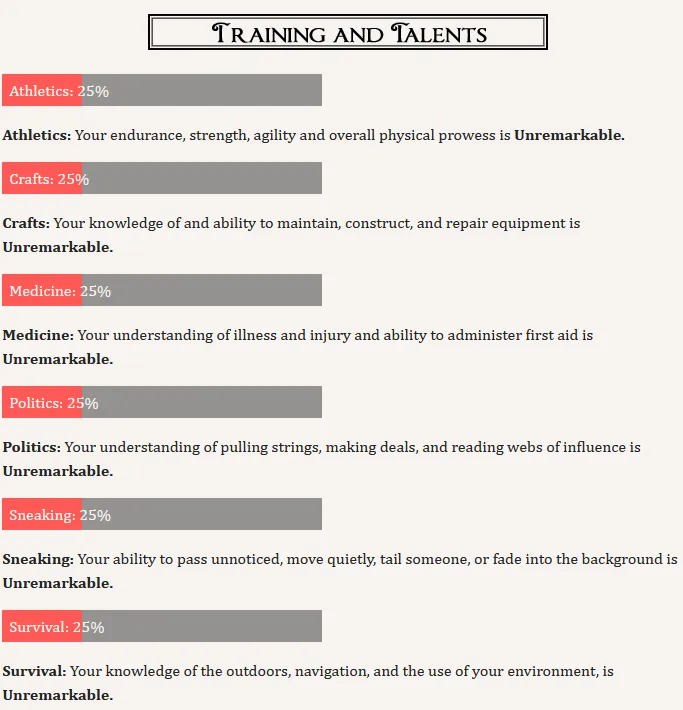
In the first chapter, you can define your skills; as the game progresses, you can take time to improve them. This may involve different dialogue or interactions, or open up unique scenes for each skill.
Here's a Chapter 1 example of defining your skills:
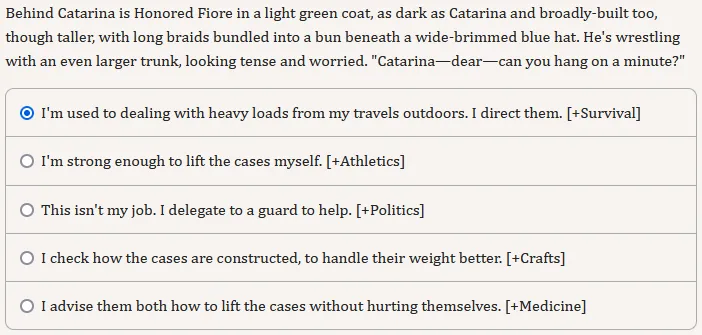
And here's an example of one of the first times in which you test them. Success and failure have consequences to relationships, reputation, your charge's grades, and in some cases—such as dealing with a major emergency—they'll have even more impact.
Failure isn't the end of the world, though. It opens up new scenes or interactions, and there will always be options to take down the line even if you've upset everyone around.
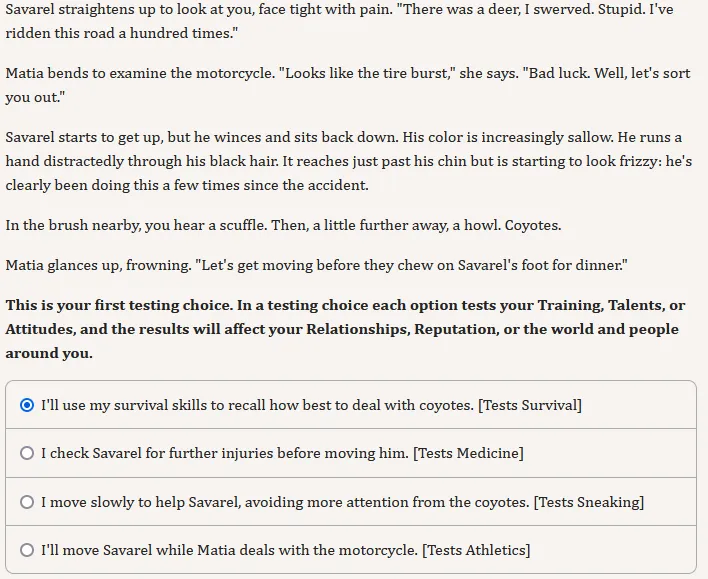
Attitudes
Attitudes relate to the PC's personality, how they take action, and their internal voice. Below are the available attitudes, at their default middle state.
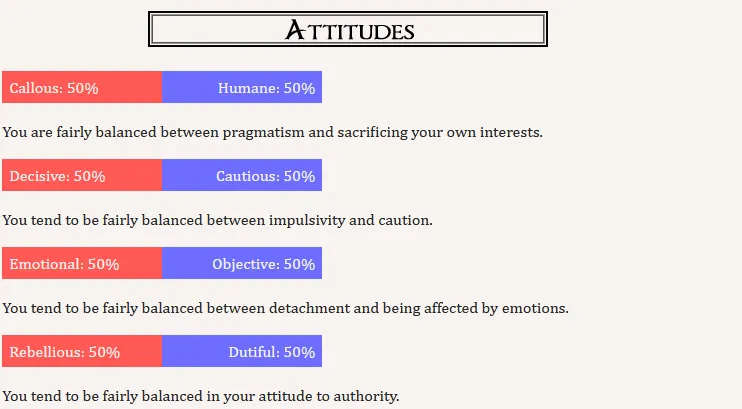
They shift a lot depending on the PC's self-expression, as seen here:
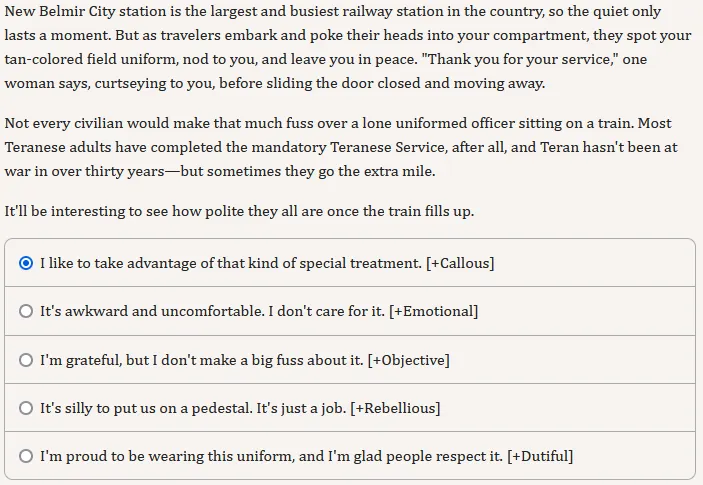
As with the Training and Talents, you can use Attitudes to impress people or otherwise handle a situation.
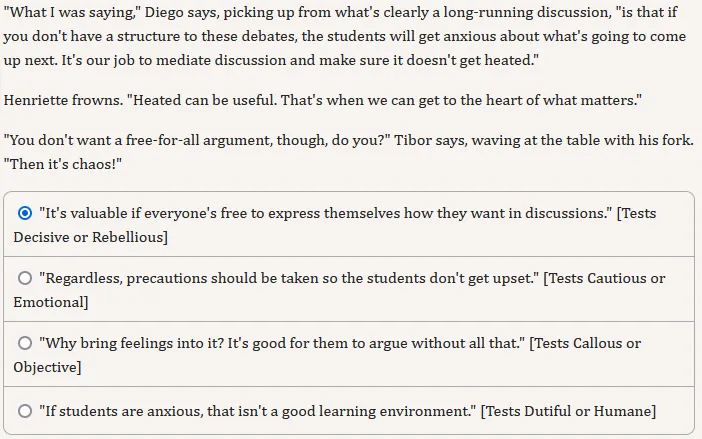
Responsivity and Flavour
Because the PC does have a lot of backstory, I challenged myself in Honor Bound to respond to the PC's background, appearance, and stats in the game as much as I could, and not just with the responses to mechanical challenges.
Sometimes, for example, a PC who was previously a medic will be able to choose a medicine-specific option that won't be visible to someone else. Or a PC with a high Survival skill will be able to talk about their insight to someone. In some cases, it's embedded in the description: a PC with high Politics will simply have knowledge about some famous people who get mentioned, so there's more detail given.
The PC's dialogue is also almost always based on their stats: even if the meat of the dialogue has the same meaning, the nuance is different. A highly Cautious PC will say something differently to a highly Decisive one.
@{(hb_dec > 50) "Push through it and it won't feel so long,"|"Don't rush to judge it. If you do that, it'll feel worse,"} you say.
Personality stats also impact the PC's narrative voice. When a PC has a thought or feeling about something, I almost always used a stat to check whether it felt right for a very Cautious PC to be thinking it, or referenced a self-expressive choice from earlier. I wanted their personality to be embedded not only in their speech and action but also in their thought patterns.
Gentle pink sunlight filters through the circular skylight above your bed, though not so bright that it gets in your eyes. Kass must have had @{(hb_rebel > 50) an expensive|a skilled} architect to create this place.
And then of course there are ways in which characters treat a PC differently if they're older or younger, or have shared experiences of various kinds.
All of this is part of how Honor Bound ended up at 600K+ words of text! It was a lot of work, but I'm very proud of how textured and specific I could make the PC feel. I was especially pleased about the feedback I had from players who felt really attached to their PCs throughout their play experience. There's something wonderful about someone replaying for the fourth time and excitedly telling me that they got some description for their particularly melancholy, ex-spy PC that they'd never seen before.
